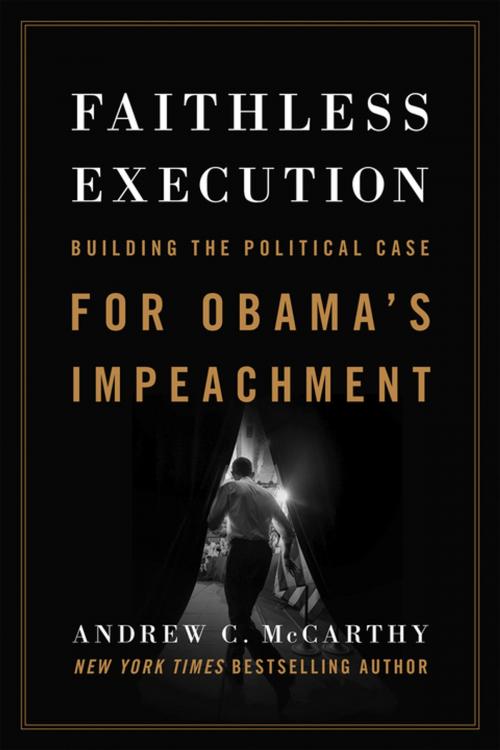Faithless Execution
Building the Political Case for Obamas Impeachment
Nonfiction, Social & Cultural Studies, Political Science, Government| Author: | Andrew C McCarthy | ISBN: | 9781594037771 |
| Publisher: | Encounter Books | Publication: | June 3, 2014 |
| Imprint: | Encounter Books | Language: | English |
| Author: | Andrew C McCarthy |
| ISBN: | 9781594037771 |
| Publisher: | Encounter Books |
| Publication: | June 3, 2014 |
| Imprint: | Encounter Books |
| Language: | English |
We still imagine ourselves a nation of laws, not of men. This is not merely an article of faith but a bedrock principle of the United States Constitution. Our founding compact provides a remedy against rulers supplanting the rule of law, and Andrew C. McCarthy makes a compelling case for using it.
The authors of the Constitution saw practical reasons to place awesome powers in a single chief executive, who could act quickly and decisively in times of peril. Yet they well understood that unchecked power in one person’s hands posed a serious threat to liberty, the defining American imperative. Much of the debate at the Philadelphia convention therefore centered on how to stop a rogue executive who became a law unto himself.
The Framers vested Congress with two checks on presidential excess: the power of the purse and the power of impeachment. They are potent remedies, and there are no others.
It is a straightforward matter to establish that President Obama has committed high crimes and misdemeanors,” a term signifying maladministration and abuses of power by holders of high public trust. But making the legal case is insufficient for successful impeachment, leading to removal from office. Impeachment is a political matter and hinges on public opinion.
In Faithless Execution, McCarthy weighs the political dynamics as he builds a case, assembling a litany of abuses that add up to one overarching offense: the president’s willful violation of his solemn oath to execute the laws faithfully. The fundamental transformation” he promised involves concentrating power into his own hands by flouting law-statutes, judicial rulings, the Constitution itself-and essentially daring the other branches of government to stop him. McCarthy contends that our elected representative are duty-bound to take up the dare.
The authors of the Constitution saw practical reasons to place awesome powers in a single chief executive, who could act quickly and decisively in times of peril. Yet they well understood that unchecked power in one person’s hands posed a serious threat to liberty, the defining American imperative. Much of the debate at the Philadelphia convention therefore centered on how to stop a rogue executive who became a law unto himself.
The Framers vested Congress with two checks on presidential excess: the power of the purse and the power of impeachment. They are potent remedies, and there are no others.
It is a straightforward matter to establish that President Obama has committed high crimes and misdemeanors,” a term signifying maladministration and abuses of power by holders of high public trust. But making the legal case is insufficient for successful impeachment, leading to removal from office. Impeachment is a political matter and hinges on public opinion.
In Faithless Execution, McCarthy weighs the political dynamics as he builds a case, assembling a litany of abuses that add up to one overarching offense: the president’s willful violation of his solemn oath to execute the laws faithfully. The fundamental transformation” he promised involves concentrating power into his own hands by flouting law-statutes, judicial rulings, the Constitution itself-and essentially daring the other branches of government to stop him. McCarthy contends that our elected representative are duty-bound to take up the dare.
We still imagine ourselves a nation of laws, not of men. This is not merely an article of faith but a bedrock principle of the United States Constitution. Our founding compact provides a remedy against rulers supplanting the rule of law, and Andrew C. McCarthy makes a compelling case for using it.
The authors of the Constitution saw practical reasons to place awesome powers in a single chief executive, who could act quickly and decisively in times of peril. Yet they well understood that unchecked power in one person’s hands posed a serious threat to liberty, the defining American imperative. Much of the debate at the Philadelphia convention therefore centered on how to stop a rogue executive who became a law unto himself.
The Framers vested Congress with two checks on presidential excess: the power of the purse and the power of impeachment. They are potent remedies, and there are no others.
It is a straightforward matter to establish that President Obama has committed high crimes and misdemeanors,” a term signifying maladministration and abuses of power by holders of high public trust. But making the legal case is insufficient for successful impeachment, leading to removal from office. Impeachment is a political matter and hinges on public opinion.
In Faithless Execution, McCarthy weighs the political dynamics as he builds a case, assembling a litany of abuses that add up to one overarching offense: the president’s willful violation of his solemn oath to execute the laws faithfully. The fundamental transformation” he promised involves concentrating power into his own hands by flouting law-statutes, judicial rulings, the Constitution itself-and essentially daring the other branches of government to stop him. McCarthy contends that our elected representative are duty-bound to take up the dare.
The authors of the Constitution saw practical reasons to place awesome powers in a single chief executive, who could act quickly and decisively in times of peril. Yet they well understood that unchecked power in one person’s hands posed a serious threat to liberty, the defining American imperative. Much of the debate at the Philadelphia convention therefore centered on how to stop a rogue executive who became a law unto himself.
The Framers vested Congress with two checks on presidential excess: the power of the purse and the power of impeachment. They are potent remedies, and there are no others.
It is a straightforward matter to establish that President Obama has committed high crimes and misdemeanors,” a term signifying maladministration and abuses of power by holders of high public trust. But making the legal case is insufficient for successful impeachment, leading to removal from office. Impeachment is a political matter and hinges on public opinion.
In Faithless Execution, McCarthy weighs the political dynamics as he builds a case, assembling a litany of abuses that add up to one overarching offense: the president’s willful violation of his solemn oath to execute the laws faithfully. The fundamental transformation” he promised involves concentrating power into his own hands by flouting law-statutes, judicial rulings, the Constitution itself-and essentially daring the other branches of government to stop him. McCarthy contends that our elected representative are duty-bound to take up the dare.















